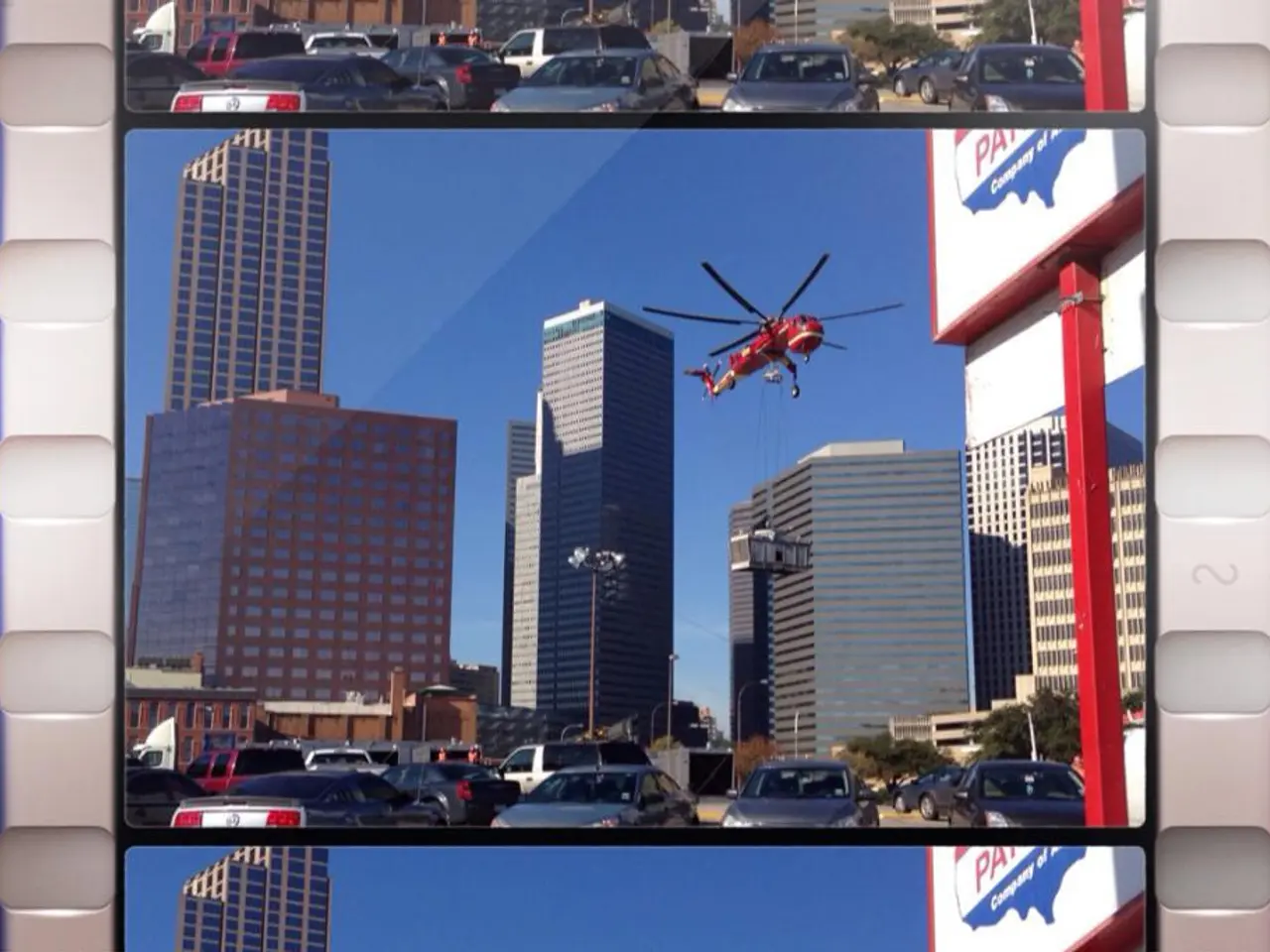Europe Witnesses Seven Showcases of Safely Assimilating Autonomous Aerial Vehicles
The European project AMU-LED is revolutionising urban mobility, focusing on the safe integration of drones for various applications such as passenger and cargo transport, as well as emergency services. Funded by the SESAR Joint Undertaking under grant agreement No 101017702, the project receives support from the European Union's Horizon 2020 research and innovation programme and SESAR JU members other than the Union.
The project, led by Pablo Menéndez-Ponte Alonso, coordinator of the UTM project at NTT DATA Spain, brings together a consortium of 17 different entities. The AMU-LED project's key objectives revolve around validating and showcasing how these drone systems can operate safely within urban environments, integrating innovative technologies and regulatory frameworks that support effective and low-emission mobility solutions in cities.
The AMU-LED project will perform flight demonstrations with various scenarios, situations, and use cases in urban environments. The demonstrations will take place in Cranfield (UK), Amsterdam (NL), Enschede (NL), Rotterdam (NL), and Santiago de Compostela (SP) throughout summer 2022. Each demonstration will focus on specific aspects of the project, such as safety, readiness, public acceptance, and social impact.
In Cranfield, the demonstrations will prove the readiness of the AMU-LED solution and serve as a prerequisite for subsequent demonstrations. The project will test two different concepts for distributing relevant data: a centralised and a decentralised architecture. The decentralised architecture will be tested in Cranfield, Enschede, and Rotterdam, and the centralised architecture will be tested in Amsterdam and Santiago de Compostela.
Rotterdam will demonstrate the economic viability of UAM, investigating the viability of transporting ships' crews directly from the vessel to the hotel. Enschede will showcase the social impact of UAM, focusing on socially relevant use cases such as medical delivery, firefighting, or police surveillance. Amsterdam will focus on public acceptance and social impact, using a focus group to gather data.
The final demonstration will take place in Santiago de Compostela, focusing on the correct implementation of all aspects in urban environments. The demonstrations aim to establish a demonstrator program that integrates various drone operations such as passenger transport (urban air taxis), cargo delivery, and emergency response through validated safety protocols, air traffic management, and infrastructure integration.
The AMU-LED project is a large-scale demonstration of the safe integration of manned and unmanned aircraft through the deployment of U-space, an air traffic management framework to enable the safe and secure integration of drones in urban airspace. The project aligns with the broader vision in Europe and globally to develop hybrid-electric and fully electric VTOL aircrafts capable of regional and urban operations, reducing emissions, and improving mobility.
As the AMU-LED project progresses, it is moving towards commercial deployments, proving the safety, sustainability, and operational feasibility of UAM drones across passenger, cargo, and emergency service sectors. For more precise or recent status updates on AMU-LED, consulting SESAR JU’s dedicated reports or the European Commission's transport innovation sources would be advisable.
- The AMU-LED project, funded by the SESAR Joint Undertaking and the European Union's Horizon 2020 research and innovation program, aims to revolutionize urban mobility.
- The project, led by Pablo Menéndez-Ponte Alonso, is focusing on the safe integration of drones for various applications.
- The AMU-LED project brings together a consortium of 17 different entities, working towards validating and showcasing safe drone operations within urban environments.
- The demonstrations will take place in multiple cities, including Cranfield, Amsterdam, Enschede, Rotterdam, and Santiago de Compostela, throughout summer 2022.
- The demo in Cranfield will test the readiness of the AMU-LED solution and assess the viability of centralized and decentralized data architectures.
- The decentralized architecture will be tested in Cranfield, Enschede, and Rotterdam, while the centralized architecture will be tested in Amsterdam and Santiago de Compostela.
- Rotterdam will investigate the economic viability of Urban Air Mobility (UAM), focusing on the transport of ships' crews from vessels to hotels.
- Enschede will showcase the social impact of UAM, with a focus on socially relevant use cases like medical delivery, firefighting, or police surveillance.
- Amsterdam will concentrate on public acceptance and social impact, gathering data through a focus group.
- Santiago de Compostela will focus on confirming the correct implementation of all aspects in urban environments.
- The project aligns with the global vision to develop hybrid-electric and fully electric Vertical Takeoff and Landing (VTOL) aircrafts capable of regional and urban operations.
- The AMU-LED project seeks to establish a demonstrator program integrating various drone operations, such as passenger transport (urban air taxis), cargo delivery, and emergency response.
- The project's aim is to reduce emissions and improve mobility within urban environments through validated safety protocols, air traffic management, and infrastructure integration.
- As the project moves towards commercial deployments, it will prove the safety, sustainability, and operational feasibility of UAM drones across passenger, cargo, and emergency service sectors.
- For more precise or recent updates on the AMU-LED project, consulting SESAR JU’s dedicated reports or the European Commission’s transport innovation sources is advisable.
- The project's progress in technology and sustainable living may attract investing opportunities in the renewable-energy, finance, business, personal-finance, real-estate, gadgets, smartphones, data-and-cloud-computing, and sustainable-living sectors.
- The integration of innovative technologies and regulatory frameworks in the AMU-LED project may inspire lifelong-learning and education-and-self-development, particularly in online-education, sports, racing, and technology.




